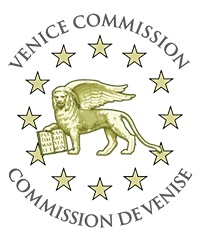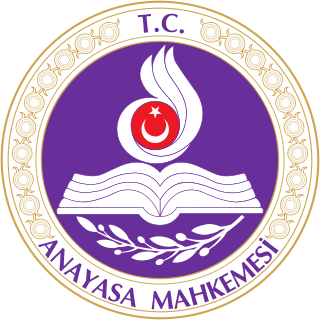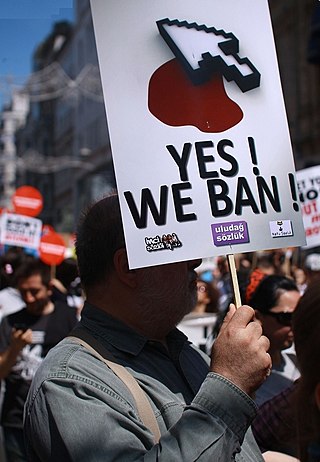Related Research Articles

The politics of Egypt are based on republicanism, with a semi-presidential system of government. The current political system was established following the 2013 Egyptian military coup d'état, and the takeover of President Abdel Fattah el-Sisi. In the current system, the President is elected for a six-year term. He can appoint up to 5 percent of the parliament. Furthermore, the President has the power to dissolve Parliament through Article 137. The Parliament of Egypt is the oldest legislative chamber in Africa and the Middle East. The unicameral Parliament has the ability to impeach the President through Article 161. With 2020 elections to the new Senate, the chamber became bicameral.

The politics of Turkey take place in the framework of a constitutional republic and presidential system, with various levels and branches of power.

A ban is a formal or informal prohibition of something. Bans are formed for the prohibition of activities within a certain political territory. Some bans in commerce are referred to as embargoes. Ban is also used as a verb similar in meaning to "to prohibit".

Human rights in Turkey are protected by a variety of international law treaties, which take precedence over domestic legislation, according to Article 90 of the 1982 Constitution. The International Covenant on Civil and Political Rights (ICCPR) was not signed by Turkey until 2000. As of today, however, Turkey is party to 16 out of 18 international human rights treaties of the United Nations. The issue of human rights is of high importance for the negotiations with the European Union (EU). Acute human rights issues include in particular the status of Kurds in Turkey. The Kurdish–Turkish conflict has caused numerous human rights violations over the years. There is an ongoing debate in the country on the right to life, torture, freedom of expression as well as freedoms of religion, assembly and association.

In politics, campaign advertising is the use of an advertising campaign through the media to influence a political debate, and ultimately, voters. These ads are designed by political consultants and political campaign staff. Many countries restrict the use of broadcast media to broadcast political messaging. In the European Union, many countries do not permit paid-for TV or radio advertising for fear that wealthy groups will gain control of airtime, making fair play impossible and distorting the political debate in the process.

The Venice Commission, officially European Commission for Democracy through Law, is an advisory body of the Council of Europe, composed of independent experts in the field of constitutional law. It was created in 1990 after the fall of the Berlin Wall, at a time of urgent need for constitutional assistance in Central and Eastern Europe.

Lesbian, gay, bisexual, and transgender (LGBT) persons in Turkey face legal challenges not experienced by non-LGBT residents, though Turkey's LGBT rights are considered to be relatively progressive compared to most other Muslim-majority countries.

The Constitutional Court of Turkey is the highest legal body for constitutional review in Turkey. It "examines the constitutionality, in respect of both form and substance, of laws, decrees having the force of law, and the Rules of Procedure of the Turkish Grand National Assembly". If necessary, it also functions as the Supreme Criminal Court to hear any cases raised about the President, Vice President, members of the Cabinet, or judges of the high courts. In addition to those functions, it examines individual applications on the grounds that one of the fundamental rights and freedoms within the scope of the European Convention on Human Rights which are guaranteed by the Constitution has been violated by public authorities.
Hijab and burka controversies in Europe revolve around the variety of headdresses worn by Muslim women, which have become prominent symbols of the presence of Islam in especially Western Europe. In several countries, the adherence to hijab has led to political controversies and proposals for a legal partial or full ban in some or all circumstances. Some countries already have laws banning the wearing of masks in public, which can be applied to veils that conceal the face. Other countries are debating similar legislation, or have more limited prohibitions. Some of them apply only to face-covering clothing such as the burqa, boushiya, or niqab; some apply to any clothing with an Islamic religious symbolism such as the khimar, a type of headscarf. The issue has different names in different countries, and "the veil" or hijab may be used as general terms for the debate, representing more than just the veil itself, or the concept of modesty embodied in hijab.

Censorship in Turkey is regulated by domestic and international legislation, the latter taking precedence over domestic law, according to Article 90 of the Constitution of Turkey.
Imperative mandate commonly refers to a provision in the Constitution of Ukraine in which members of the Verkhovna Rada are bound by the constitution and laws of Ukraine to remain members of the parliamentary faction or bloc in which they were elected. Imperative mandate provisions were defined in the Constitution in articles Articles 78 and 81.

The 2005 Egyptian constitutional referendum took place in Egypt on 25 May 2005. The referendum was on a proposed change to the constitution of Egypt which would establish direct elections for the presidency. The opposition parties called for a boycott of the vote, which was passed by a large majority.
Citizens United v. Federal Election Commission, 558 U.S. 310 (2010), was a landmark decision of the Supreme Court of the United States regarding campaign finance laws and free speech under the First Amendment to the U.S. Constitution. It was argued in 2009 and decided in 2010. The court held 5-4 that the free speech clause of the First Amendment prohibits the government from restricting independent expenditures for political campaigns by corporations, including nonprofit corporations, labor unions, and other associations.

Presidential elections were held in Egypt in 2012, with the first round on 23 and 24 May 2012 and the second on 16 and 17 June. The 2012 Egyptian Presidential election was the first democratic presidential election of Egypt’s history. The Muslim Brotherhood declared early 18 June 2012, that its candidate, Mohamed Morsi, won Egypt's presidential election, which would be the first victory of an Islamist as head of state in the Arab world. It was the second presidential election in Egypt's history with more than one candidate, following the 2005 election, and the first presidential election after the 2011 Egyptian revolution which ousted president Hosni Mubarak, during the Arab Spring. However, Morsi's presidency was brief and short-lived, and he later faced massive protests for and against his rule, only to be ousted in a military coup in July that year.

The Constitution of the Republic of Turkey, also known as the Constitution of 1982, is Turkey's fundamental law. It establishes the organization of the government and sets out the principles and rules of the state's conduct along with its responsibilities in regards to its citizens. The constitution also establishes the rights and responsibilities of the latter while setting the guidelines for the delegation and exercise of sovereignty that belongs to the Turkish people.
Language policy in Ukraine is based on its Constitution, international treaties and on domestic legislation. According to article 10 of the Constitution, Ukrainian is the official language of Ukraine, and the state shall ensure the comprehensive development and functioning of the Ukrainian language in all spheres of social life throughout the entire territory of the country. Other languages spoken in Ukraine are granted constitutional protection, and Russian is recognized as the language of a national minority.
The December 2009 Kurdish protests in Turkey were five days of protests in Turkey that ensued after a December 11, 2009 ruling by the Constitutional Court of Turkey that banned the pro-Kurdish Democratic Society Party (DTP), after finding them guilty of having links to the outlawed Kurdistan Workers' Party (PKK) and spreading "terrorist propaganda."

The Russian undesirable organizations law is a law that was signed by President Vladimir Putin on 23 May 2015 as a follow-up to the 2012 Russian foreign agent law and Dima Yakovlev Law. The law gives prosecutors the power to extrajudicially declare foreign and international organizations "undesirable" in Russia and shut them down. Organizations that do not disband when given notice to do so, as well as Russians who maintain ties to them, are subject to high fines and significant jail time. Critics say the terms are unclear and lead to dangerous precedent. Supporters of the bill reference organizations that have become actively involved in supporting political dissent.

Filiz Kerestecioğlu Demir is a Turkish politician from the Peoples' Democratic Party (HDP) who currently serves as a Member of Parliament since the June 2015 general election.
The amendments of 2020, which were proposed in January 2020, are the second substantial amendments to the Constitution of Russia of 1993. To introduce these amendments, Vladimir Putin, president of Russia, held a national vote. They were approved on 1 July by a contested popular vote.